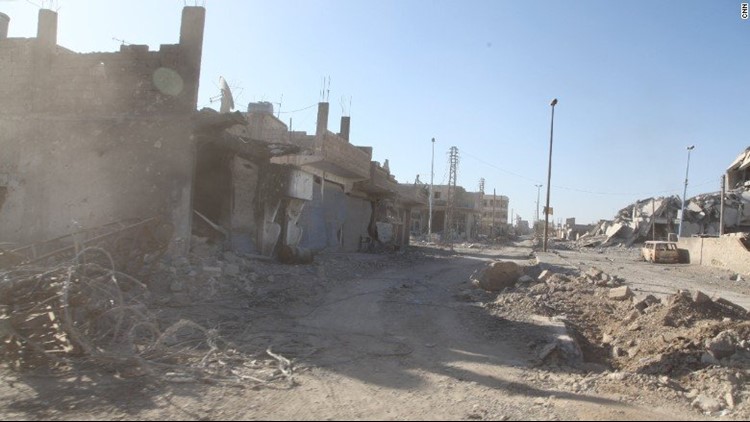US-backed militias on Friday declared the “total liberation” of the Syrian city of Raqqa, which for more than three years was the de facto capital of ISIS.
Speaking at a ceremony held to celebrate the capture of Raqqa, Syrian Democratic Forces spokesman Talal Silo claimed a “historic victory” over ISIS and said the extremist group had suffered a “brutal” defeat.
He paid tribute to all those killed and injured in the struggle, as well as all the Syrian factions that battled for 130 days to force ISIS from its key Syrian stronghold and their international backers.
Silo said control of the city would be handed over to civilian leaders once clearing operations were completed and that the SDF would guarantee the protection of the city and its province.
“The future of Raqqa will be decided by its people,” Silo said, as he urged the international community to support their rebuilding efforts.
A daunting task lies ahead of Raqqa’s recently created civilian council, made up of local citizens, as they seek to restore the devastated city.
The ceremony was held in the same dusty Raqqa stadium where ISIS fighters made their last stand earlier this week.
SDF commanders told CNN that the choice of location was intended to add insult to injury following the extremist group’s defeat there.
Local officials, dignitaries and tribal chiefs from Raqqa and neighboring towns and cities were among those to attend, alongside members of the Syrian Democratic Council, which is tasked with helping to rebuild the city.
Footage from the former soccer stadium showed jubilant SDF fighters dancing hand-in-hand to music pumping from loudspeakers as they gathered ahead of the ceremony.
Prison cells
The SDF believe ISIS held many detainees within the stadium, the group’s biggest prison in the city, SDF chief press officer Mustafa Bali said. The SDF had hoped to find around 300 “missing” Kurds when the stadium was seized from ISIS control but they were not there, he said.
ISIS turned the changing and locker rooms on the lower level of the stadium into prison cells and interrogation rooms, Bali said.
On the lower level, CNN saw room after room with holes punched through the walls to create a kind of “rat run,” through which ISIS fighters could move. A number of rooms appeared to have been used as cells. Some had what the SDF said were detainees’ names, with dates next to them, written on the walls.
The rooms on the lower levels have not yet been fully cleared and may still be rigged with homemade explosive devices, the SDF said. Large numbers of flies buzzed around the stadium, possibly drawn by the presence of corpses lying undiscovered under the rubble.
A few ISIS fighters are believed still to be at large in the network of tunnels that ISIS dug under the city.
It could take months to clear the city of explosives, one Kurdish commander, Rojda Falat, told CNN.
Residents are being told to stay away from Raqqa for now, until landmines and booby traps — found in many of the towns and cities ISIS has fled — are removed. Many are living in overcrowded refugee camps as they wait to return home.
Black flag hauled down
A sustained effort to retake the city began in early June, in an operation led by the SDF and supported by coalition air strikes.
The US-backed SDF announced the last phase of the operation at the weekend. ISIS finally lost control of the city on Tuesday, when the terror group’s black flag was hauled down from Raqqa’s stadium.
The SDF declared “major military operations” over, although pockets of resistance remained.
Seized in early 2014, Raqqa soon became the nerve center of the group’s sprawling bureaucracy. It also was the hub for planning overseas terror attacks — especially in France and Belgium — because so many foreign fighters called it home.
Now, it is a symbol of the terror group’s decline. ISIS controls only a small strip of territory along the Euphrates River in northern Syria.



